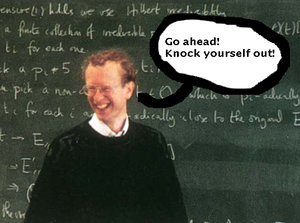Unsolved problems in mathematics
| Unsolved Problems This article is part of Uncyclopedia's unsolved problems in … series. |
|---|
| Unsolved problems in … |
Unsolved mathematical problems are those which have either exceeded the intellect of every living mathematician so far in history, or are just plain impossible, or no one has really cared to bother with it much, as of yet.
The problem of the unsolved problems[edit]
Finding solutions to unsolved problems is becoming an increasing problem, due to the decreasing numeracy of an increasingly calculator-dependent population, who have lost any number sense. Kids these days can't even recognize the equation below is actually a limerick from 1980 by Leigh Mercer:
The Millennium Prize Problems are too much for most of the population, who wouldn't even recognize imaginary numbers such as twiddly-two or eleventy-eight. The unsolved problems in math which should challenge the general population ought to be of a humbler nature, and less intellectually dense. What follows are some examples.
Unsolved Math Problems for the Common Man[edit]
Examples of unsolvable mathematical problems include, but are by no means limited to, the following:
The unequal equality problem[edit]
The solution to 1 = 2 has driven many a mathematician to drink, especially when he or she is asked to solve for the unknown. Most people take the easy way out and say that the statement 1 = 2 is false. But that's just lazy.
The two or more unknowns problem[edit]
Solving a single equation with more than one unknown has also caused many a mathematician to weep openly.
The problem of the square root of bugger all times six[edit]
There needs to be a more elegant solution to the problem than just "bugger all". An alternate solution is needed, because that would imply that "bugger all" is its own square root.
The redefinition of the numerical properties of the number zero[edit]
While we are on the topic, the properties of zero need to be cleaned up. According to the proceedings of the 2008 AMS Conference, zero is at the heart of computer failure, affecting everything from recording instruments to guided missile systems. This is due to zero's unruly nature ascribed to it by humans. When we say that division by zero lacks definition, it is because we have not bothered. Mankind invented the number system, it is a construct of our own perceptions and ideas. Surely we can invent a zero that does not cause so much mayhem when you divide by it accidentally in a computer program. But for now mankind is the zero's bitch. Zero pwns mankind and the world, and the madness has got to stop.
The Inconvenience of Indeterminate Forms[edit]
Indeterminate forms are problems which face us that have no actual defined value. Division by zero, as shown above, leads to undefined behaviour. But there are other problems which the common man can understand, and hopefully offer a solution. L'Hôpital's Rule was made to take care of many cases of undefined behaviour in algebra by cancelling like terms in a rational function, and so on. But there are many other cases where indeterminate forms can't be avoided. The rewards for solving most of these problems are immense, and can result in fame, fortune, and a place in history.
The problem of [edit]
What about the problem of evaluating ? If you cancel them out, do you really get 1? If you could, we could definitely get something for nothing and our economic problems would vanish the world over.
The problem of [edit]
What about ? Since the properties of infinity are such that , we are given to believe that . What utter hogwash! If that's true, that means we can't cancel the infinities to make 1! What number behaves like that? It looks like we need to tame infinity also.
The problem of [edit]
Your math teacher told you that anything to the power zero equals 1, but what about ? If it can equal 1, then you can get something for nothing again. So this remains an expression which is without definition. This is also up for grabs. If you can define it so that my calculator doesn't give me an error, there is either a Field's Medal or a Nobel Prize in it for you, and a place in history. Get to work!
The problem of [edit]
Another one up for grabs. Everyone knows that , but what if the operation were performed times? One thing is, no one has tried it, but another thing is, that mathematicians have shown that isn't really equal to 1, as proven by the limit , so this means that the equation should be looked upon with suspicion.
The problem of [edit]
Yes, and solve for . Go ahead. Dare ya! Double dog dare ya!
Opaque story problems[edit]
A bus drives along its daily route. At the first stop, two guys get on. At the next stop, three guys get on and one guy gets off. At the third stop, three guys get off and four guys get on. At the fourth stop, eight people get on and six guys get off. What is the name of the driver?
Now, they say there is no solution to this kind of math problem. But that is only that no one has worked at it enough yet.
Billy's unfinished math problems[edit]
Billy is a kid in grade eight who had a homework assignment to hand in to his teacher today and he didn't finish it. There is a whole sheet of unsolved math problems that were left blank because he wanted to play FIFA on his PS/3 with his buddies and watch Avatar on Blu-Ray for the rest of the evening. Billy is a lazy bum who text messages his friends while in math class and frequently asks to "go to the bathroom" (he has no medical problems). He is mathematically illiterate due to a litany of his own avoidance behavior. Sucks to be Billy.
Disproving Fermat's Last Theorem[edit]
In this case, You play the part of the rogue and try to undermine the work of Andrew Wiles, who a lot of bigwigs say proved Fermat's last theorem in 1995. All you need to do to pull the rug out from under Dr. Wiles, is to prove that for any integer , is to find a combination of 3 integers and , for which the equation is satisfied. You only need to find one, so I'm pretty sure a kid could even do this. Maybe you can give it to Billy. Naw, he never feels like doing math.
Solutions to higher order polynomials (for the uncommon man)[edit]
 The ghost of Neils Abel says: "Don't go there! Don't do it!" The ghost of Neils Abel says: "Don't go there! Don't do it!"... Unless you want to disprove all of Group Theory.
|
In high school, you were taught where a line crosses the -axis. Then you used the quadratic formula to find where a parabola crossed the -axis. For cubics like you were probably told that you needed to use synthetic division and the factor theorem and such, so long as where the cubic crossed the -axis was a fraction or whole number. And if your math teacher was particularly sadistic, he or she would make you memorize the cubic formula:
... and that would only be right, because now your range of solutions for cubics would be on par with the quadratic formula.
Neils Henrik Abel said that the buck stops at order-5. There are no nice, tidy formulas like the one above if the order of the polynomial is too high. While Abel adds that no such formula can ever be found, and even though he hasn't been proven wrong in nearly 200 years, I think it's about time that someone find a formula which can solve all polynomials of order 5. You might need a PhD in math first. Just sayin'.
























![{\displaystyle x={\sqrt[{3}]{\left({\frac {b^{3}}{27a^{3}}}+{\frac {bc}{6a^{2}}}-{\frac {d}{2a}}\right)+{\sqrt {\left({\frac {b^{3}}{27a^{3}}}+{\frac {bc}{6a^{2}}}-{\frac {d}{2a}}\right)^{2}+\left({\frac {c}{3a}}-{\frac {b^{2}}{9a^{2}}}\right)}}}}}](https://en.wikipedia.org/api/rest_v1/media/math/render/svg/89c1597cdf67ab87349c1fede87578f8dfeae9ca)
![{\displaystyle \ \ +\ \ {\sqrt[{3}]{\left({\frac {b^{3}}{27a^{3}}}+{\frac {bc}{6a^{2}}}-{\frac {d}{2a}}\right)-{\sqrt {\left({\frac {b^{3}}{27a^{3}}}+{\frac {bc}{6a^{2}}}-{\frac {d}{2a}}\right)^{2}+\left({\frac {c}{3a}}-{\frac {b^{2}}{9a^{2}}}\right)}}}}\ \ -\ \ {\frac {b}{3a}}}](https://en.wikipedia.org/api/rest_v1/media/math/render/svg/c800b8e770542bd66e6033b80a09e41e71184ffb)